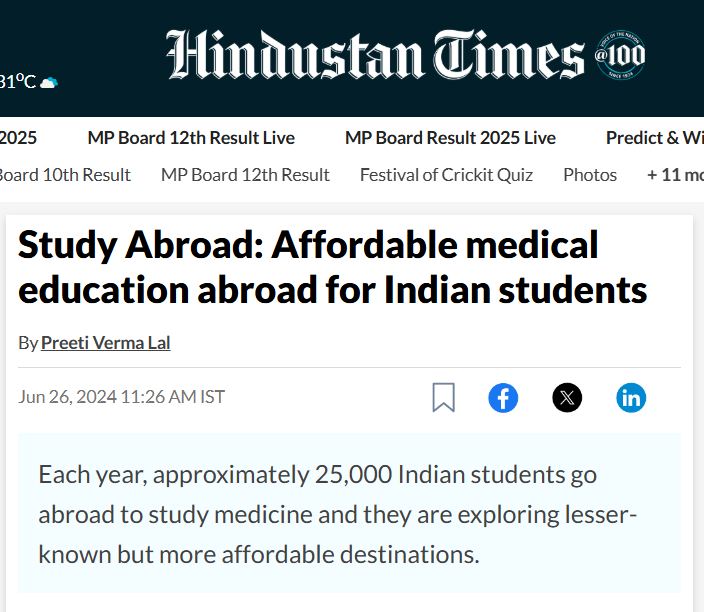
☝️ At a glance
- Affordable Global MBBS Options: Studying MBBS abroad is cost-effective compared to Indian private colleges, with countries like Russia, Europe, and Germany offering quality education for ₹25-45 lakhs. These destinations eliminate hefty donations and provide direct admission based on NEET scores.
- Top Countries & Universities: Czech Republic, Europe, and Germany are top choices due to NMC-approved universities, English-medium programs, and advanced infrastructure. The Philippines is ideal for USMLE aspirants, while Kyrgyzstan and Bangladesh offer the lowest fees.
- Easy Admission & Global Recognition: Unlike India’s competitive seats, foreign universities have simpler admission processes and globally recognized degrees. Graduates can practice in India after clearing FMGE or pursue international careers.
- Key Considerations: Students should prioritize NMC-approved colleges, budget, and language of instruction. Proper research ensures safety, scholarships, and a smooth transition for a successful medical career abroad.
Introduction to studying MBBS abroad
Every year, thousands of Indian students dream of becoming doctors, but limited seats in Indian medical colleges make admission highly competitive. According to recent data, over 25,000 Indian students go abroad annually to pursue MBBS due to the scarcity of affordable and high-quality medical education in India.

Become a global doctor with MBBS abroad!
Studying abroad can be affordable and stress-free with futureMBBS:
- World-recognized universities with English-taught programs
- On-site support in partner university cities
- Guaranteed placements & internships for hands-on experience
From selecting universities and supporting you with the application process to orientation and finding accommodation – we are at your side.
Studying MBBS abroad offers numerous advantages, including lower costs, world-class education, global exposure, and better career prospects. Countries like Russia, Ukraine, China, the Philippines, and Georgia have become top destinations for Indian medical aspirants due to their NMC (National Medical Commission) approved universities, affordable tuition fees, and English-medium instruction.
This comprehensive guide explores the benefits, costs, eligibility, top universities, and key considerations for Indian students planning to study MBBS abroad.

Source: Hindustan Times
Benefits of MBBS in abroad
1. Affordable tuition fees
Government medical colleges in India have limited seats, while private medical institutions charge exorbitant fees (₹50 lakhs to ₹1 crore). In contrast, countries like Russia, Ukraine, Germany, and UK offer affordable medical education at low tuition fees for ₹25-50 lakhs for the entire MBBS course with quality education.
2. No donation or capitation fees
Unlike private medical colleges in India, most foreign universities do not demand hefty donations, making education more accessible.
3. Global recognition & NMC approval
Top medical universities abroad are recognized by WHO (world health organization), NMC (National Medical Council), ECFMG, and FAIMER, allowing graduates to practice in India after clearing the FMGE (Foreign Medical Graduates Examination).
4. High-quality education & advanced infrastructure
Many foreign medical universities provide modern labs, research facilities, and hands-on clinical training, ensuring a strong foundation in medicine.
5. No NEET score requirement in some countries
While NEET is mandatory for Indian students to study abroad, some universities do not require high NEET scores for admission, unlike Indian colleges where cutoffs are extremely high (650+ for AIIMS).
6. International exposure & multicultural environment
Studying abroad helps students interact with peers from different countries, improving cultural adaptability—a crucial skill for doctors.
7. Easier admission process
Unlike India’s lengthy counseling and entrance procedures, many foreign universities offer direct admission based on Class 12 marks and NEET qualification.

Study medicine abroad with 100% support!
futureMBBS offers full support to make your dream of studying medicine abroad a reality.
- Hassle-free admission guidance
- Fast-tracked visa processing
- Post-arrival support, including accommodation assistance
Top medical colleges and universities
University | Country | Unique features |
|---|---|---|
Charles University, Pilsen | Czech Republic | One of the oldest medical universities in Europe; Offers a diverse international student community; High-quality education and research in medical fields; among the best 1.5 % of all universities worldwide |
Palacky University, Olomouc | Czech Republic | Offers a strong emphasis on practical training; Located in a beautiful, historic city with a low cost of living; English-medium programs. |
Charles University, Prague | Czech Republic | Offers cutting-edge medical research; Top-tier medical faculty; Recognized as one of the best medical schools in Europe; Integration into one of the largest and most modern hospitals in Europe |
Jessenius University, Martin | Slovakia | High academic standards and strong ties with European healthcare institutions; Affordable living and educational costs; English language programs available; most modern medical campus in Slovakia |
Comenius University, Bratislava | Slovakia | Strong reputation for research and training in medical fields; Offers a multicultural student experience; One of Slovakia’s top medical institutions; 178 best universities (according to the Round World Teaching Ranking) in the world. |
UPJS, Kosice | Slovakia | Offers high-quality medical education with modern facilities; Focus on research in medical sciences; One of the leading universities in Slovakia; degrees are accredited in the European Union. |
Semmelweis University, Budapest | Hungary | Recognized as the top medical university in Hungary; Offers clinical training at top hospitals; Strong focus on research and international collaboration. |
Medical University, Pécs | Hungary | Offers innovative medical programs and high-quality education in English; One of the most popular choices among international students in Europe. Today, the university has about 20,000 students, of which about 4,500 are international students from 70 countries. |
Medical University, Szeged | Hungary | Internationally recognized for research; Offers a practical approach to medical training; High standards of teaching and clinical exposure. |
University of Latvia, Riga | Latvia | One of the top medical universities in Latvia; Offers affordable tuition fees; Strong connections with hospitals for clinical practice. It is among the top 2.5 % of the world's best institutions |
Stradins University, Riga | Latvia | Modern infrastructure with a focus on global healthcare issues; Recognized for research and practical training in medicine; Multicultural environment. |
University of Health Sciences, Kaunas | Lithuania | Focuses on medical education with a global perspective; High-quality education; Strong emphasis on practical training and research. |
University of Nicosia, Nicosia | Cyprus | Internationally recognized medical degrees; English language courses; Focus on the global health system; Modern facilities and strong academic reputation. |
Victor Babes University, Timisoara | Romania | Offers high-quality medical education with research opportunities; Focus on practical training; One of Romania’s most prestigious medical schools. |
Medical University, Cluj Napoca | Romania | Recognized for its modern teaching methods and facilities; One of Romania's leading medical schools; Focus on European and international healthcare standards. |
School of Medicine, Split | Croatia | Provides high-quality education and practical clinical training; Focus on research and evidence-based medical practices; English programs available. |
Medical University, Poznan | Poland | Offers affordable tuition fees and high-quality education; Focus on practical training in renowned hospitals; Highly regarded in Central Europe. |
Medical University, Lodz | Poland | Recognized for its high academic standards; Offers high-quality medical degrees and clinical exposure in Europe’s leading healthcare centers. |
Masaryk University, Brno | Czech Republic | Offers an interdisciplinary approach to medical education; Strong focus on clinical training and research; One of the most reputable universities in Czech Republic. |
Pursuing MBBS abroad: Eligibility and requirements
Minimum age: 17 years by 31st December of the admission year
Academic qualifications: Completion of 10+2 with Physics, Chemistry, and Biology (PCB) with a minimum of 50% marks (40% for reserved categories)
Qualifying NEET exam: Indian students must qualify for the National Eligibility cum Entrance Test (NEET)
Language proficiency: English proficiency for English-medium courses (IELTS/TOEFL may be required in some countries)
Valid passport: Required for visa application and travel.
Study MBBS abroad: Admission process
The admission process for studying MBBS abroad is generally straightforward:
Application form: Complete the application form provided by the university.
Documentation: Submit required documents like academic transcripts, NEET scores, passport copies, and passport-sized photos.
Entrance exam: Each country has it's university-specific exam basis that students are selected.
Admission letter: After evaluation, eligible candidates receive an admission or offer letter.
Visa application: Apply for a student visa to the respective country.
Arrival: Once the visa is approved, make travel arrangements and attend orientation programs as scheduled by the university.
Costs, scholarships and financial aid
Scholarships & financial assistance
Many countries offer merit-based and need-based scholarships to Indian students, such as:
Russian Government Scholarships
China scholarship council (CSC) grants
Philippines’ SEARCA Scholarships
Cost of study
The total cost of studying MBBS abroad ranges between ₹15-50 lakhs, including:
Tuition fees: ₹3-8 lakhs per year
Hostel & living expenses: ₹1.5-3 lakhs per year
Visa & insurance: ₹50,000-1 lakh
Expense | India (Private colleges) | USA | UK | Russia | China | Central Asia (Kazakhstan, Uzbekistan) | Europe (Czech Republic, Latvia, Poland, etc.) |
|---|---|---|---|---|---|---|---|
Tuition fees (Total) | ₹50 lakh - ₹1.5 crore | ₹80 lakh - ₹1.5 crore | ₹70 lakh - ₹1.2 crore | ₹20 lakh - ₹30 lakh | ₹25 lakh - ₹35 lakh | ₹15 lakh - ₹25 lakh | ₹20 lakh - ₹60 lakh |
Hostel & accommodation | ₹10,000 - ₹20,000/month | ₹60,000 - ₹80,000/month | ₹50,000 - ₹70,000/month | ₹15,000 - ₹25,000/month | ₹15,000 - ₹30,000/month | ₹10,000 - ₹20,000/month | ₹15,000 - ₹35,000/month |
Food & other expenses | ₹5,000 - ₹10,000/month | ₹20,000 - ₹40,000/month | ₹25,000 - ₹35,000/month | ₹10,000 - ₹15,000/month | ₹10,000 - ₹20,000/month | ₹5,000 - ₹10,000/month | ₹10,000 - ₹20,000/month |
MBBS program fees structure and curriculum
University | Fees/Semester (INR) | Total Fees for 6 Years (INR) |
|---|---|---|
Charles University, Pilsen, Czech Republic | 7.20 lacs | 86.40 lacs |
Palacky University, Olomouc, Czech Republic | 5.69 lacs | 68.28 lacs |
Charles University, Prague, Czech Republic | 7.74 lacs | 92.88 lacs |
Jessenius University, Martin, Slovakia | 4.96 lacs | 59.52 lacs |
Comenius University, Bratislava, Slovakia | 5.00 lacs | 60.00 lacs |
UPJS, Kosice, Slovakia | 5.70 lacs | 68.40 lacs |
Semmelweis University, Budapest, Hungary | 8.29 lacs | 99.50 lacs |
Medical University, Pécs, Hungary | 6.74 lacs | 80.88 lacs |
Medical University, Szeged, Hungary | 7.20 lacs | 86.40 lacs |
University of Latvia, Riga, Latvia | 5.59 lacs | 67.00 lacs |
Stradins University, Riga, Latvia | 5.69 lacs | 68.28 lacs |
University of Health Sciences, Kaunas, Lithuania | 5.77 lacs | 69.22 lacs |
University of Nicosia, Nicosia, Cyprus | 9.11 lacs | 1.10 cr |
Victor Babes University, Timisoara, Romania | 3.65 lacs | 43.80 lacs |
Medical University, Cluj Napoca, Romania | 3.87 lacs | 46.44 lacs |
School of Medicine, Split, Croatia | 5.46 lacs | 65.52 lacs |
Medical University, Poznan, Poland | 7.11 lacs | 85.32 lacs |
Medical University, Lodz, Poland | 6.56 lacs | 78.72 lacs |
Masaryk University, Brno, Czech Republic | 6.83 lacs | 81.96 lacs |
The MBBS programs abroad typically lasts 5-6 years, including:
Pre-Clinical (2 years): Anatomy, Biochemistry, Physiology
Clinical (3 years): Medicine, Surgery, Pediatrics
Internship (1 year): Hands-on hospital training
Safety and security for Indian students
When we talk about the safety of Indian students studying MBBS abroad, we found out that Europe serves as a safe haven for education for International students. Be it any part of Europe, you will always find yourself in safe hands of police department.
How to choose a medical university
Choosing the right university which falls under your budget and also provide world class medical education is important. Countries like Kazagsthan, Ukraine though provide medical education at very low rate but passing ratio after coming to India is very less.
You can check out the country wise performance of students in FMGE exam which is for practice medicine in India after completing MBBS from abroad, with a 100%
To avoid any admission related scams, it is advisable to take help from trustworthy MBBS abroad consultants like futureMBBS who pave the way for Indian medical students to study MBBS abroad by following ways:
1. Free career guidance
futureMBBS provides comprehensive guidance through free career counseling sessions to help students plan their medical career effectively.
2. Admission assistance
From understanding the eligibility criteria to preparing for the application process, futureMBBS makes the admission process seamless. 900+ students have achieved their dream of becoming a doctor with us!
3. University selection
Choosing the right university is critical. futureMBBS helps students select the best medical universities based on their preferences, academic performance, and financial considerations.
4. Visa services
The visa application process can be complex, but with futureMBBS, students benefit from fast-tracked, hassle-free visa approvals.
5. Post-arrival support
futureMBBS goes the extra mile to ensure students settle in comfortably. From helping students find living accommodations to arranging for airport pickups, every detail is taken care of.
Service | Details |
|---|---|
Accommodation Assistance | Assistance with finding apartments or hostels |
Study Resources | E-learning tools, preparatory courses, etc. |
Internship and Placements | Guaranteed internships and job placements for practical training |
Documents required for admission
Here is a list of essential documents for MBBS admission abroad:
Valid passport
NEET scorecard
Academic certificates (10th and 12th grade)
Birth certificate
Passport-sized photos
Language proficiency test scores (if applicable)
Medical examination report
Exams and assessments for MBBS abroad
Some universities require entrance tests in addition to NEET:
MCAT Medical College Admission Test (USA)
BMAT BioMedical Admissions Test (UK)
IMAT International Medical Admissions Test (Italy)
Conclusion
Studying MBBS in India with rising competition here, studying MBBS abroad is a smart alternative for Indian students seeking affordable, high-quality medical education. Countries like Russia, Ukraine, China, and the Philippines offer globally recognized degrees, lower costs, and better admission chances.
By choosing an NMC-approved medical universities , clearing the FMGE exam, and gaining international exposure, Indian students can build a successful medical career globally by pursuing MBBS studies abroad.
Your medical career abroad starts here!
Thinking of pursuing MBBS abroad? Don’t just dream it, do it!
Start your MBBS journey!FREQUENTLY ASKED QUESTIONS
FAQs about "Why MBBS abroad"
1. Why do people do MBBS abroad?
Indian medical aspirant choose to study MBBS abroad for several reasons, including access to good medical education, affordable tuition fees compared to Indian private colleges, global exposure, English-medium programs, and recognized medical degrees. Countries like Russia, Germany, Ukraine, and the Europe offer well-established medical programs that attract Indian students.
2. Is it better to be a doctor in India or abroad?
Whether it is better to be a doctor in India or abroad depends on individual preferences. Doctors in India benefit from serving a large population and have opportunities in both private and public sectors. On the other hand, doctors abroad may earn higher salaries, work in advanced healthcare systems, and gain international recognition. However, practicing abroad may require clearing licensing exams like USMLE, PLAB, or local medical council exam
3. How much does it cost to study MBBS in abroad?
Tuition Fees: Ranges from USD 3,000 to 15,000 per year (INR 2,46,000 to 12,30,000), depending on the country and university.
4. Which country is best to study MBBS?
The best countries for MBBS are Germany, Ukraine, Europe, US, and Georgia, offering affordable fees (₹15-35 lakhs), English-medium programs, and NMC recognition. Russia and China provide top-quality education, while the Philippines is ideal for USMLE aspirants.
5. What is the NEET score for MBBS abroad?
The qualifying NEET score for MBBS abroad is typically around the 50th percentile for general category students and 40th percentile for reserved categories.




